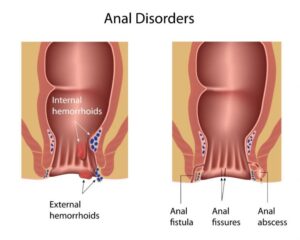Anal fissure is a rupture of the inner thin tissue of the rectal mucosa (anus), causing severe pain or bleeding during bowel movements. Anal fissure is a common disease that can affect people of all ages.

SYMPTOMS
- Severe pain during bowel movements.
- Pain after bowel movements that can last for several hours.
- The presence of blood in the stool.
- Itching, or perianal irritability.
- Visible fissure in the perianal skin.
- A small bump on the skin near the anal fissure.
CAUSES
- Passage of hard or large stool.
- Constipation andchronic diarrhea.
- Rectal inflammation caused by Crohn’s disease, or inflammatory bowel disease.
- Anal cancer and sexually transmitted diseases.

Diagnosis
Your doctor will ask you about your medical history and may perform a simple manual rectal examination to check the anal canal. The doctor may also recommend further examination if they suspect and underlying condition causing anal fissure.
Flexible sigmoidoscopy:
Your doctor will insert a thin flexible tube with a small camera into the lower part of the colon. This test may be done if you are younger than 50 years old and do not have risk factors for bowel disease or colon cancer.
Colonoscopy:
Your doctor will insert a flexible tube into the rectum to check the entire colon. Colonoscopy may be performed if you are over 50, have colon cancer risk factors, signs of other conditions, or other symptoms, such as abdominal pain or diarrhea.
Anoscopy:
Your doctor will perform a digital rectal exam first. Then, a lubricated thin tube called an anoscope is inserted few centimeters into the rectum to check the entire anal canal and a sample for biopsy can be taken, if needed.
Anal Fissures Treatment
Nonsurgical treatment
The nonsurgical treatment of anal fissure is based on lifestyle changes, such as following a fiber-rich diet, drinking more fluids and exercising. Also, the doctor may recommend using creams and suppositories that contain steroids to relieve the pain accompanying bowel movements. Nitroglycerin creams can also help enhancing healing process.
Surgical treatment
In case you have a chronic anal fissure that cannot be treated with nonsurgical remedies, your doctor may recommend surgery. A procedure called lateral internal sphincterotomy (LIS) is performed to cut a small portion of the anal sphincter muscle to reduce spasm and pain and allow the anal fissure to heal.
Preventing anal fissure
Although anal fissures cannot always be prevented, you can reduce its risk by taking the following preventive measures:
- Keep the anal area dry and clean all the time.
- Take warm baths to relax the anal muscles, relieve irritation
- Avoid eating hard-to-digest foods, such as popcorn and potato chips.
- Drink plenty of fluids.
- Do not hold your bowel movement for long, go to the bathroom if you feel the need to defecate.
- Treat any digestive problems, such as chronic diarrhea or constipation.
To book a consultation with our specialist proctologist or for more information about Anal Fissure Treatments, call us toll-free on 800 (NOVO) 6686 or click the live chat icon at the bottom of the screen.



























